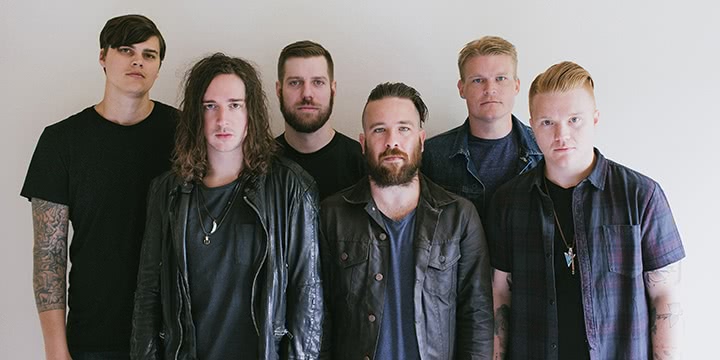In 1997, a group of high school kids from Florida set out to give metalcore a makeover.
Back then, Underoath had no real grasp of just how big they would make it. They would go on to tour relentlessly, release seven studio albums between 1999 and 2010, and go through a personnel makeover of their own. After all that, Underoath were left feeling overtaxed, with the physical and emotional demands of the band taking a hefty toll.
In October 2012, Underoath announced they were parting ways, with lead guitarist Timothy McTague saying of the break-up: “Underoath was never supposed to be my career.” These princes of metalcore departed with the release of a career-spanning album, Anthology: 1999-2013, and a farewell tour that concluded with an emotionally charged final performance in January 2013. It was the end of Underoath – or so we thought.
Last August, after months of the phrase “Rebirth is coming” being teased across social media, the band announced a reunion. Now, McTague admits they were more a part of each other’s lives than they had realised.
“It’s called ‘Rebirth’ because it’s the band coming back,” he says. “In 2013 we thought it was the last time we were gonna play music. We sold our gear and got regular jobs. Then in 2015 we got together and said, ‘What if we do another tour and see how it feels?’ We realised we missed each other and we love each other – now we’re back!”
Underoath are already several months into the Rebirth Tour, and shows have sold out the world over. It begs the question: why did they break up in the first place, if the demand from fans was still so rabid?
“We just hit a spot where we weren’t healthy together,” says McTague. “We were going ten, maybe 11 months of the year together for ten years. The dynamic on tour started suffering and the thought of writing music together in such a fragmented state felt like an impossible feat.
“We tried to figured out how to make any and all situations work, and no one could agree on anything. We realised, ‘Wow, the chapter’s closed.’ It was emotional, it was the end of an era for us and we thought it was done, but we were happily wrong.”
It’s hardly surprising that reviews of their reunion performances are overwhelmingly positive, though it makes you wonder if there’s a greater sense of urgency surrounding these shows. McTague certainly thinks so. “We starved the market accidentally for three years. All these people who didn’t come to the shows because they thought, ‘Oh, they’re gonna be here forever,’ then it hit: ‘Oh crap, we missed it.’ Now we’re back, people are gravitating towards us in case we go again.
“We realised we were appreciated – and probably a lot of our fans underappreciated us – and a lot of the band didn’t appreciate the fans, because you lose that spontaneity, romance and excitement. When we went away, it was a sharp, harsh, quick reality. There were a lot of people that were pissed. It was more at the time when we broke up, it was so far gone that certain dudes had full-time commitments – but it was in no way a dip or a slight.”
Performing their albums They’re Only Chasing Safety and Define The Great Line in full, the Rebirth Tour recalls Underoath’s rise to become a genre-defining band.
“When Chasing Safety came out, I was 21, I was a child – we didn’t give a crap back then,” McTague says. “We were in the metal scene – we were too heavy for the poppy kids and too light for the heavy kids, but they embraced us and said, ‘No, this is exactly what we need right now.’
“Out of nowhere we sold 150,000 albums and our label told us, ‘You guys are on your way to being one of the biggest bands on the scene.’ So yeah, it was really weird, it was rad, it just kept selling and we just had no idea why. Define was written after that, and we didn’t wanna be embraced as a poppy heavy band.”
These two albums stand out for McTague as being the most musically diverse. “The thing that happened when those records came out was a different thing,” he says.
“There’s a lot of people that have tried to replicate that and a lot that have done better and worse. [Other bands] asked us, ‘How can my album do this? What did you do to get so big?’ We were getting asked like we were masterminds – the reality is, we were kids.
“I don’t think we ever set out to be a genre-defining band – I think by osmosis and the sheer size of our band, it was never the goal. A lot of bands say they were encouraged [by us], even Bring Me The Horizon and A Day To Remember, so I do think we played a role in showing that you can be heavy and melodic at the same and still be successful.
“You can never be deluded by your music for the sake of your success – that’s where our baton stops and other bands took that idea of being authentic but also catering their music.”
[Underoath photo by Joshua Weaver]
UnderoathplayEnmore Theatre onSaturday February 11, withSleepmakeswaves.


































